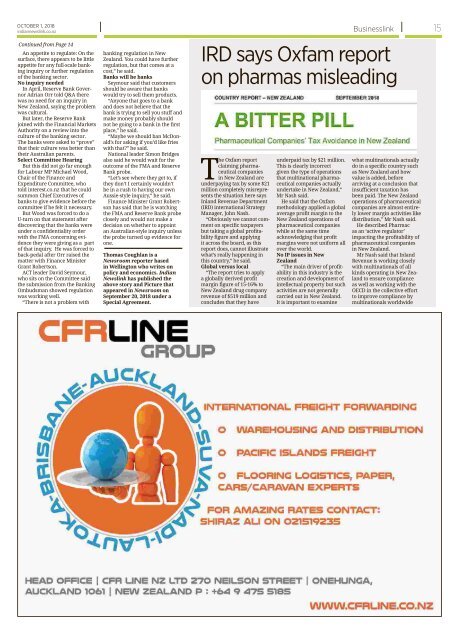You also want an ePaper? Increase the reach of your titles
YUMPU automatically turns print PDFs into web optimized ePapers that Google loves.
OCTOBER 1, <strong>2018</strong><br />
Businesslink<br />
15<br />
Continued from Page 14<br />
An appetite to regulate: On the<br />
surface, there appears to be little<br />
appetite for any full-scale banking<br />
inquiry or further regulation<br />
of the banking sector.<br />
No inquiry needed<br />
In April, Reserve Bank Governor<br />
Adrian Orr told Q&A there<br />
was no need for an inquiry in<br />
New Zealand, saying the problem<br />
was cultural.<br />
But later, the Reserve Bank<br />
joined with the Financial Markets<br />
Authority on a review into the<br />
culture of the banking sector.<br />
The banks were asked to “prove”<br />
that their culture was better than<br />
their Australian parents.<br />
Select Committee Hearing<br />
But this did not go far enough<br />
for Labour MP Michael Wood,<br />
Chair of the Finance and<br />
Expenditure Committee, who<br />
told interest.co.nz that he could<br />
summon Chief Executives of<br />
banks to give evidence before the<br />
committee if he felt it necessary.<br />
But Wood was forced to do a<br />
U-turn on that statement after<br />
discovering that the banks were<br />
under a confidentiality order<br />
with the FMA concerning evidence<br />
they were giving as a part<br />
of that inquiry. He was forced to<br />
back-pedal after Orr raised the<br />
matter with Finance Minister<br />
Grant Robertson.<br />
ACT leader David Seymour,<br />
who sits on the Committee said<br />
the submission from the Banking<br />
Ombudsman showed regulation<br />
was working well.<br />
“There is not a problem with<br />
banking regulation in New<br />
Zealand. You could have further<br />
regulation, but that comes at a<br />
cost,” he said.<br />
Banks will be banks<br />
Seymour said that customers<br />
should be aware that banks<br />
would try to sell them products.<br />
“Anyone that goes to a bank<br />
and does not believe that the<br />
bank is trying to sell you stuff and<br />
make money probably should<br />
not be going to a bank in the first<br />
place,” he said.<br />
“Maybe we should ban McDonald’s<br />
for asking if you’d like fries<br />
with that?” he said.<br />
National leader Simon Bridges<br />
also said he would wait for the<br />
outcome of the FMA and Reserve<br />
Bank probe.<br />
“Let’s see where they get to, if<br />
they don’t I certainly wouldn’t<br />
be in a rush to having our own<br />
Aussie-style inquiry,” he said.<br />
Finance Minister Grant Robertson<br />
has said that he is watching<br />
the FMA and Reserve Bank probe<br />
closely and would not make a<br />
decision on whether to appoint<br />
an Australian-style inquiry unless<br />
the probe turned up evidence for<br />
one.<br />
Thomas Coughlan is a<br />
Newsroom reporter based<br />
in Wellington who writes on<br />
policy and economics. <strong>Indian</strong><br />
<strong>Newslink</strong> has published the<br />
above story and Picture that<br />
appeared in Newsroom on<br />
September 20, <strong>2018</strong> under a<br />
Special Agreement.<br />
IRD says Oxfam report<br />
on pharmas misleading<br />
The Oxfam report<br />
claiming pharmaceutical<br />
companies<br />
in New Zealand are<br />
underpaying tax by some $21<br />
million completely misrepresents<br />
the situation here says<br />
Inland Revenue Department<br />
(IRD) international Strategy<br />
Manager, John Nash.<br />
“Obviously we cannot comment<br />
on specific taxpayers<br />
but taking a global profitability<br />
figure and applying<br />
it across the board, as this<br />
report does, cannot illustrate<br />
what’s really happening in<br />
this country,” he said.<br />
Global versus local<br />
“The report tries to apply<br />
a globally derived profit<br />
margin figure of 15-16% to<br />
New Zealand drug company<br />
revenue of $519 million and<br />
concludes that they have<br />
underpaid tax by $21 million.<br />
This is clearly incorrect<br />
given the type of operations<br />
that multinational pharmaceutical<br />
companies actually<br />
undertake in New Zealand,”<br />
Mr Nash said.<br />
He said that the Oxfam<br />
methodology applied a global<br />
average profit margin to the<br />
New Zealand operations of<br />
pharmaceutical companies<br />
while at the same time<br />
acknowledging that profit<br />
margins were not uniform all<br />
over the world.<br />
No IP issues in New<br />
Zealand<br />
“The main driver of profitability<br />
in this industry is the<br />
creation and development of<br />
intellectual property but such<br />
activities are not generally<br />
carried out in New Zealand.<br />
It is important to examine<br />
what multinationals actually<br />
do in a specific country such<br />
as New Zealand and how<br />
value is added, before<br />
arriving at a conclusion that<br />
insufficient taxation has<br />
been paid. The New Zealand<br />
operations of pharmaceutical<br />
companies are almost entirely<br />
lower margin activities like<br />
distribution,” Mr Nash said.<br />
He described Pharmac<br />
as an ‘active regulator’<br />
impacting the profitability of<br />
pharmaceutical companies<br />
in New Zealand.<br />
Mr Nash said that Inland<br />
Revenue is working closely<br />
with multinationals of all<br />
kinds operating in New Zealand<br />
to ensure compliance<br />
as well as working with the<br />
OECD in the collective effort<br />
to improve compliance by<br />
multinationals worldwide


















